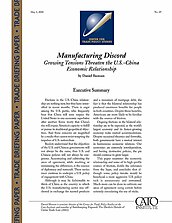Frictions in the U.S.-China relationship are nothing new, but they have intensified in recent months. There is angst among the U.S. public, who frequently hear that China will soon surpass the United States in one economic superlative after another. Some worry that China’s rise will impair America’s capacity to fulfill or pursue its traditional geopolitical objectives. And those concerns are magnified by a media that cannot resist tempting the impulses of U.S. nationalism.
Realists understand that the objectives of the U.S. and Chinese governments will not always be the same, thus U.S. and Chinese policies will not always be congruous. Accentuating and cultivating the areas of agreement, while resolving or minimizing the differences, is the essence of diplomacy and statecraft. These tactics must continue to underpin a U.S. policy of engagement with China.
Although it may be fashionable to think of China as the country to which the U.S. manufacturing sector was offshored in exchange for tainted products and a mountain of mortgage debt, the fact is that the bilateral relationship has produced enormous benefits for people in both countries. Despite those benefits, Americans are more likely to be familiar with the sources of friction.
Ongoing frictions in the bilateral relationship are to be expected, as the world’s largest economy and its fastest-growing economy make mutual accommodations. Despite occasional theatrics and fireworks, both governments have a mutual interest in harmonious economic relations. Our economies are extremely interdependent, and barring destructive policies, the pie should continue to grow larger.
This paper examines the economic relationship and some of its high-profile sources of friction, distills the substance from the hype, and concludes that although some policy tweaks would be beneficial, a more aggressive U.S. policy tack is unnecessary and unwanted. Much more can be done to cultivate our areas of agreement using carrots before seriously considering the use of sticks.

This work is licensed under a Creative Commons Attribution-NonCommercial-ShareAlike 4.0 International License.

